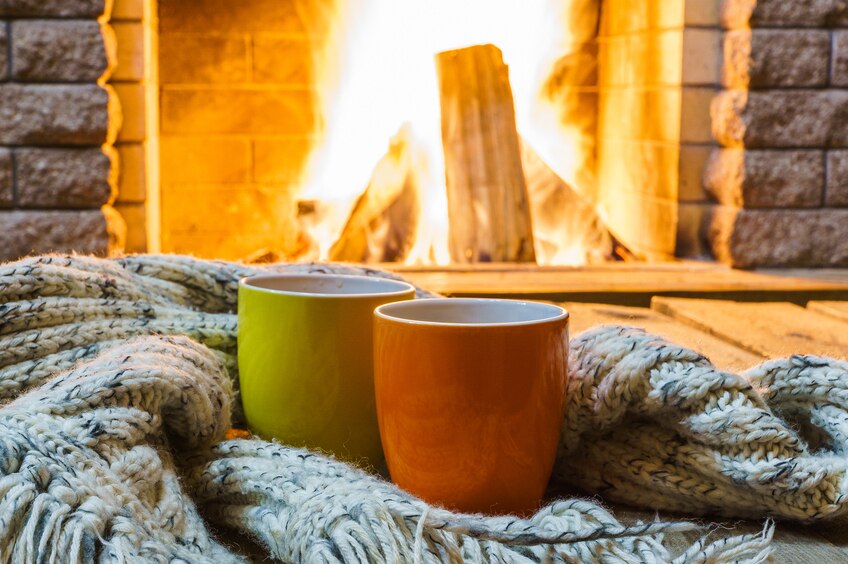Aromatic logs, the orange glow of flames, and the heat emanating from a fireplace can make even the coldest winter days more tolerable. Preparing your fireplace for winter is imperative to ensure that it performs efficiently and safely throughout the cold season and beyond. Here are some tips for preparing a fireplace and chimney for winter so it can provide the comfort you desire during the cold months.
Utilize Proper Ventilation to Stay Safe
Proper ventilation is essential for your home to breathe. Beyond attic ventilation, homes have vents connected to natural gas appliances and fireplaces designed to exhaust harmful contaminants such as carbon monoxide. In the winter, snow or ice can accumulate around these exhaust vents, preventing pollutants from being expelled.
If your chimney vents are blocked, you may experience symptoms of illness, including headaches, nausea, fatigue, and dizziness. Regularly check on all of your vents to ensure that they are clear and free from debris.
Keep the Cold Air Out of a Fireplace
Stay aware of the chimney effect (or stack effect) in winter, as it can potentially lead to cold air and smoke back drafting into your home. The chimney effect occurs as warm air rises and collides with colder outside air, causing that chilled air to rush down your chimney and inside your home. Keeping the damper closed when the fireplace is not in use is one way that can prevent this from happening.
When using the fireplace, you can mitigate or even prevent the chimney effect by preheating the flue. Lighting some kindling and holding it up the chimney before lighting the main fire can help warm the air in the flue and lessen the impact of the warm air meeting cold when you start the fire.
When not operating the fireplace, consider using a fireplace cover during winter months. This helps to provide an additional barrier against cold air entering your home.
Handle Trespassing Critters
A chimney is often seen as a safe haven by animals trying to find shelter from freezing temperatures outside. Small rodents like squirrels or raccoons may find your chimney an appealing place to hide. If you hear noises coming from the chimney and suspect that an animal may be hiding inside, consider calling a chimney professional to inspect and examine the chimney. They can safely deal with the removal of animals and inspect the chimney for any animal-related damage.
It is also sometimes possible for an animal to die in your chimney. You might not even know it until you either notice a rotting smell or experience trouble exhausting smoke out of the chimney. In both cases, it's wise to call in a professional to evaluate the situation.
Address Snow and Water Intrusion
Your chimney is exposed to the elements, and it's common for snow to build up in winter or for water to make its way inside during rainstorms. Should you have any cracked bricks or mortar, they will eagerly absorb the water, helping to guide it inside the chimney. Once it freezes, it expands, causing further damage to the structure.
Once water enters the chimney, it has the potential to mix with the creosote and cause a foul odor. If you have a bad smell coming from your chimney, it may be a sign of water penetration. Water damage can be devastating to your home, so it is important to address it right away before the damage gets worse.
Your chimney is also protected by step flashing where it connects with your roof. This is typically a metal flashing that a professional should inspect each year to ensure that it remains watertight.
Cap Off the Opening
As a homeowner, you have options to help protect your chimney from damage. GAF offers the Master Flow® safety cap for chimneys in fixed and adjustable sizes to fit any chimney. This can help protect your home from sparks, downdrafts, and animal or water intrusion—however, make sure you reach out to a chimney professional to help you cap off the opening.
Contact your local, certified GAF contractor* today to talk about options for preparing your chimney for winter to get the best performance out of your cozy fireplace!
*Contractors enrolled in GAF certification programs are not employees or agents of GAF, and GAF does not control or otherwise supervise these independent businesses. Contractors may receive benefits, such as loyalty rewards points and discounts on marketing tools from GAF for participating in the program and offering GAF enhanced warranties, which require the use of a minimum amount of GAF products. Your dealings with a Contractor, and any services they provide to you, are subject to the GAF Contractor Terms of Use.

